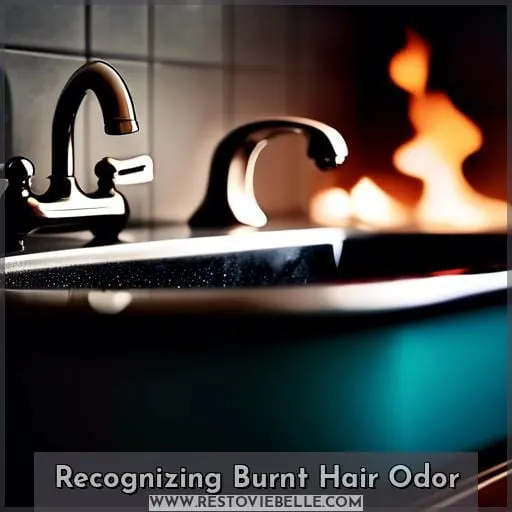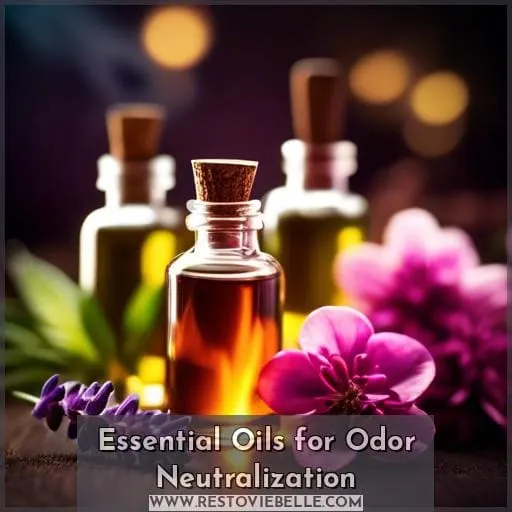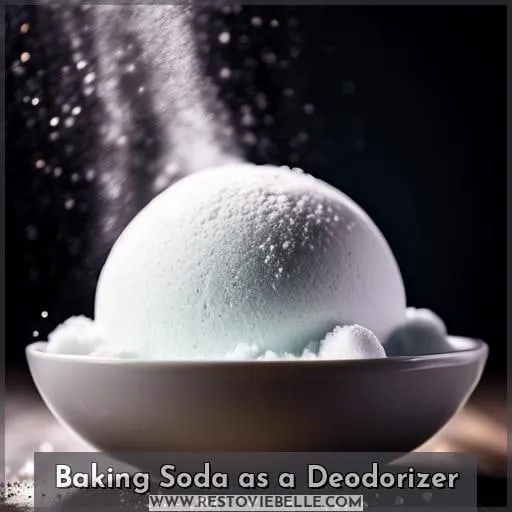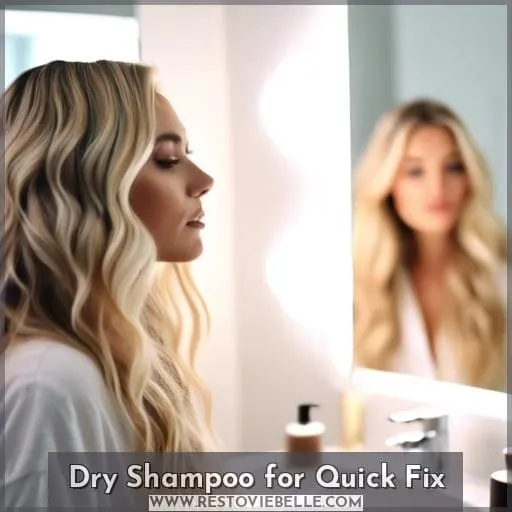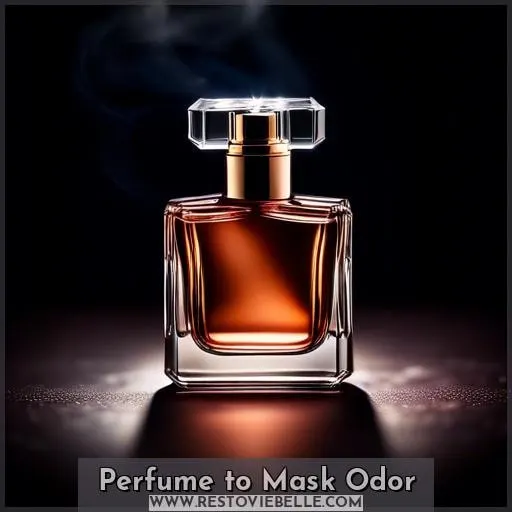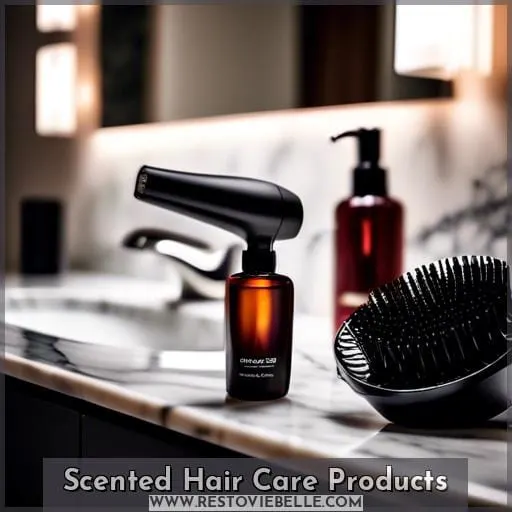This site is supported by our readers. We may earn a commission, at no cost to you, if you purchase through links.
 Like a phoenix rising from the ashes, your hair’s vibrancy can be reborn, free from the lingering scent of damage.
Like a phoenix rising from the ashes, your hair’s vibrancy can be reborn, free from the lingering scent of damage.
If you’re grappling with the stubborn, burnt hair smell, fear not. This guide offers savvy tips to neutralize odors and restore freshness.
From essential oils to household staples like vinegar and baking soda, you’ll discover how to reclaim the natural allure of your locks, ensuring they’re not only fragrant but also radiate health and confidence.
To eliminate the burnt hair smell, create a paste with baking soda and water, apply to damp hair before shampooing, or use a white vinegar rinse for a scalp reboot.
Table Of Contents
- Key Takeaways
- Recognizing Burnt Hair Odor
- Essential Oils for Odor Neutralization
- Vinegar Rinse for Smell Removal
- Baking Soda as a Deodorizer
- Dry Shampoo for Quick Fix
- Perfume to Mask Odor
- Preventing Burnt Hair Smell
- Detangling With Natural Oils
- Scented Hair Care Products
- Frequently Asked Questions (FAQs)
- Can burnt hair smell be a sign of an underlying scalp condition?
- How does the environment, like humidity or pollution, affect the persistence of burnt hair smell?
- Are there any long-term effects on hair health from repeated exposure to burnt hair smell?
- Can dietary changes have any impact on the susceptibility of hair to burning or the intensity of the burnt hair smell?
- How do different hair textures and types (such as curly, straight, thick, or fine) influence the methods needed to remove burnt hair smell?
- Conclusion
Key Takeaways
- Essential oils such as lavender, tea tree, and citrus oils can neutralize burnt hair smell due to their antibacterial and deodorizing properties. They can be added to shampoos, conditioners, sprays, or used in hair masks.
- A vinegar rinse, made by mixing equal parts vinegar and water, can help remove the burnt smell from hair. Applying this mixture to the hair and scalp after shampooing and rinsing thoroughly can also restore the hair’s pH balance.
- Baking soda can act as a deodorizer for burnt hair smell. Creating a paste with baking soda and water and applying it to damp hair before shampooing can neutralize odors and leave hair smelling fresher.
- Preventing burnt hair smell involves keeping the temperature of styling tools below 400 degrees, avoiding overuse of silicones in hair products, styling hair in small sections to minimize heat damage, and considering hair masks for damage control.
Recognizing Burnt Hair Odor
Recognizing the burnt hair odor is crucial for maintaining healthy locks.
If you’ve noticed a persistent burnt smell after styling, it’s a sign you may be applying too much heat.
To address this, ensure you’re using a heat protectant and consider lowering the temperature on your styling tools.
Causes of Odor
The burnt hair smell often stems from heat damage caused by styling tools exceeding 350º. Chemical treatments, chlorine exposure, and product buildup further contribute to this unpleasant odor.
To combat it, consider a vinegar rinse or using a heat protectant spray. These steps are crucial in your hair care routine to get rid of the burnt hair smell.
Signs of Damage
Recognizing the unpleasant scent of burnt hair is often the first sign that your hair has suffered damage. Heat damage can manifest as split ends, frizziness, and a rough texture, indicating moisture loss and weakened hair structure.
Product residue and chemical build-up can further exacerbate the issue, leading to scalp irritation. To maintain hair health, it’s crucial to adopt hair care tips that prevent damage, such as using heat protectants and avoiding excessive heat styling.
If you notice these signs, it’s time to take action with hair care advice that can help restore your hair’s vitality and eliminate the burnt odor.
Essential Oils for Odor Neutralization
To tackle the unpleasant burnt hair smell, you can turn to the natural power of essential oils.
Lavender, tea tree, and citrus oils are particularly effective for neutralizing odors.
These oils not only provide a pleasant scent but also possess antimicrobial properties that can help to address the underlying causes of the odor.
Lavender Oil
Lavender oil, with its delightful fragrance, isn’t just pleasing to the senses but also offers a multitude of benefits for hair and scalp health. Its antimicrobial properties help prevent bacteria and fungi from thriving on the scalp, which can alleviate issues like dandruff and itchiness.
Moreover, lavender oil can promote circulation to the hair follicles, encouraging stronger and faster hair growth.
Incorporating lavender oil into your hair care routine can nourish your hair, leaving it silky soft and smooth. It’s particularly effective when used in products like leave-in creams or conditioners. Beyond its direct benefits to hair, lavender oil can also be a source of relaxation.
Its aroma has been shown to calm the nervous system, which can be beneficial for both your mood and sleep quality.
For those looking to use lavender oil, it can be added to shampoos or conditioners, or applied directly to the scalp in a diluted form with a carrier oil. Regular use can improve hair texture, reduce frizz, and contribute to overall hair health.
Essential oils like lavender aren’t only a natural remedy for hair concerns but also offer a sensory experience that can enhance your well-being.
Tea Tree Oil
Tea tree oil, with its myriad benefits, can be a potent ally in neutralizing hair odors. Extracted from the leaves of Melaleuca alternifolia, it’s celebrated for its antibacterial and antifungal properties.
These properties make it particularly effective against the bacteria that can contribute to the burnt hair smell. When applying tea tree oil, it’s crucial to dilute it properly to avoid skin irritation or allergic reactions, as it can be toxic if used incorrectly.
Additionally, tea tree oil extraction through steam distillation ensures the preservation of its beneficial compounds, such as terpinen-4-ol, which is responsible for much of its antimicrobial activity.
For those seeking alternatives, baking soda and heat protectant creams are also valuable for managing hair care and styling while preventing damage and odors.
Citrus Oils
Citrus oils are a refreshing choice for neutralizing burnt hair odors. Here’s how to use them:
- Add a few drops to your shampoo for a fragrant hair treatment.
- Mix with water for a DIY deodorizing hair spray.
- Combine with dry shampoo to refresh hair between washes.
- Use in hair masks for scent longevity and added hair benefits.
These oils not only provide a pleasant citrus note but also contribute to the overall health of your hair.
Vinegar Rinse for Smell Removal
To prepare a vinegar rinse for removing the burnt hair smell, you’ll want to mix equal parts of vinegar and water. Apply this solution to your hair and scalp after shampooing, ensuring even distribution.
Let it sit for a few minutes to allow the vinegar to neutralize odors, then rinse it out thoroughly with water. This simple technique can help restore the pH balance of your scalp and eliminate unwanted smells.
Remember to use the rinse sparingly to avoid drying out your hair, and consider following up with a conditioner to keep your hair moisturized.
Preparing the Rinse
After exploring the benefits of essential oils for neutralizing odors, it’s time to prepare a vinegar rinse, a potent ally in your hair care routine. This simple yet effective treatment can help remove that persistent burnt hair smell.
| Ingredient | Quantity | Purpose |
|---|---|---|
| White Vinegar | 1 part | Neutralizes odors |
| Water | 1 part | Dilutes vinegar |
| Spray Bottle | 1 | Applies mixture |
Mix equal parts of vinegar and water in a spray bottle. After you’ve turned the heat down on your styling tools and switched up your hair products, spritz this solution onto your scalp and hair. Let it sit for a few minutes to work its magic, then rinse thoroughly. Integrating this rinse into your hair care treatments can lead to a fresher, cleaner-smelling mane.
Application Technique
To apply a vinegar rinse for removing burnt hair smell, you’ll need to consider your hair type, as this can affect the product concentration and application time.
Start by mixing vinegar and water in a 1:1 ratio. Gently pour the mixture over your hair and scalp, ensuring even coverage. Allow it to sit for a few minutes to neutralize odors and restore pH balance. Rinse thoroughly with water.
Individual results may vary, so if the scent of vinegar is strong for your scent preference, you can add a few drops of essential oil to the mixture. This hair care solution is a simple and effective way to get rid of burnt hair smell.
Baking Soda as a Deodorizer
To tackle the unpleasant burnt hair smell, baking soda can be an effective deodorizer due to its natural odor-absorbing properties.
You can create a simple paste by mixing baking soda with a bit of water and applying it to your hair before shampooing.
This method helps neutralize odors and leaves your hair smelling fresher.
Creating the Paste
To create an effective deodorizing paste with baking soda, you’ll need to mix the right amounts to achieve the desired consistency.
Start by combining 2 to 3 tablespoons of baking soda with just enough water to form a thick paste. Apply this mixture to your damp hair, ensuring it’s evenly distributed, particularly focusing on areas where the burnt smell is strongest.
Allow the paste to sit on your hair for several minutes, giving it time to neutralize odors. The duration of application can vary depending on your hair texture; those with thicker hair may need to leave it on longer.
To remove the paste, thoroughly rinse your hair with water, using a gentle massaging technique to ensure all the baking soda is washed out. This simple removal technique helps to refresh your hair without leaving any residue.
Application and Removal
After creating your baking soda paste, it’s time to apply it to your hair. Dampen your locks and gently massage the paste into your scalp and through the strands, focusing on areas with product buildup.
This natural deodorizer will absorb unwanted odors. After letting it sit for a few minutes, rinse thoroughly. For an extra odor-fighting boost, follow with a white vinegar rinse. This acidic solution can help dissolve any lingering residue and neutralize odors.
Remember to use a heat protectant before styling to prevent future scents and consider nourishing hair masks to maintain healthy, fragrant tresses.
Dry Shampoo for Quick Fix
When you’re in need of a quick fix for that lingering burnt hair smell, dry shampoo can be your go-to solution.
It’s important to choose the right product for your hair type and color to avoid any unwanted residue.
When applying, focus on the greasiest parts of your hair, usually at the roots, and be sure to hold the canister a good distance from your scalp for even distribution.
Choosing the Right Product
After tackling odors with baking soda, let’s focus on dry shampoo for a quick fix.
- Product Effectiveness: Look for powder-based formulas, which are gentle and absorb oil without drying out your hair.
- Ingredient Comparison: Avoid products with alcohol, which can lead to dryness and irritation. Instead, opt for natural ingredients like rice or oat starch.
- DIY Alternatives: If you’re in a pinch, household items like cornstarch or baby powder can be effective substitutes.
Application Tips
Once you’ve chosen the right dry shampoo, it’s time to apply it effectively. Shake the can well, then hold it about 6 inches from your head. Spray in short bursts along the roots, where oil and odor are most prominent. Massage the product into your scalp with your fingertips to distribute it evenly and absorb excess oils.
| Step | Tip |
|---|---|
| 1 | Shake can well |
| 2 | Hold 6 inches from roots |
| 3 | Spray in short bursts |
| 4 | Massage into scalp |
Perfume to Mask Odor
When it comes to masking the burnt hair smell, perfume can be a quick and effective solution.
When applying, hold the bottle a few inches away from your hair and lightly spray, ensuring not to saturate your locks. This technique helps to freshen up your hair without overwhelming it or causing further damage.
Selecting a Scent
When selecting a fragrance to mask the odor of burnt hair, consider your olfactory preferences and scent compatibility.
A fragrance that aligns with your sensory stimulation can significantly enhance your mood.
Spraying Technique
After selecting your scent, focus on the technique. Hold the bottle a few inches away from your hair to ensure even spray coverage.
A quick, short burst is all you need, aiming away from the roots to avoid oiliness. Don’t overdo it; one or two spritzes are enough. Repeat only if necessary, keeping spray frequency minimal for safety.
Preventing Burnt Hair Smell
Preventing the unpleasant burnt hair smell involves a few key steps that are easy to incorporate into your hair care routine.
First, always use a heat protectant before styling with hot tools to shield your hair from damage. Keeping the temperature of these tools below 400 degrees Fahrenheit can also significantly reduce the risk of burning your hair and producing that unwanted odor.
Additionally, regularly cleaning your styling tools can prevent product build-up, which can contribute to the burnt smell when heated.
By following these simple tips, you can enjoy styled hair without the worry of it smelling burnt.
Heat Protectant Use
While perfume can temporarily mask burnt hair odor, preventing it’s key. Here’s how:
- Apply heat protectant before styling.
- Choose products with beneficial ingredients.
- Understand the protectant’s advantages.
- Seek out top recommendations or alternatives.
Temperature Control
After applying a heat protectant, it’s crucial to manage the temperature setting on your styling tools.
Excessive heat can lead to damage, so always start with a lower temperature and increase only if necessary.
Regular tool maintenance and proper heat styling techniques help prevent product accumulation and safeguard your hair from heat damage.
Tool Cleaning
To maintain your styling tools and prevent burnt hair smell, it’s essential to keep them clean. Regularly remove product residue from your flat iron or curling iron to ensure optimal performance and safeguard your hair from heat damage.
For effective cleaning, use alcohol pads or a vinegar solution to wipe down the tools, especially when they’re warm for easier removal of buildup.
Cleaning brushes and other styling tools also help in preventing the transfer of old product back onto your hair, which can contribute to the burnt smell. Proper iron maintenance, including cleaning and storage, is crucial for preventing heat damage and extending the life of your tools.
Detangling With Natural Oils
Detangling your hair doesn’t have to be a struggle, especially when you turn to natural oils for help. These oils not only make the process smoother but also nourish your hair, leaving it healthier and more manageable.
Let’s explore how goat milk, aloe vera, and coconut milk can transform your detangling routine and overall hair care.
Benefits of Goat Milk
Goat milk is a treasure trove for your hair, packed with minerals, proteins, vitamins, and natural fats. These components work together to soften your locks, making detangling a breeze.
Its rich content not only adds moisture but also imparts a glossy shine to your hair, enhancing its overall health and appearance. By incorporating goat milk into your hair care routine, you’re treating your hair to a nourishing experience that leaves it looking shiny and feeling incredibly soft.
Aloe Vera and Coconut Milk
Aloe vera and coconut milk are natural oils that offer a moisturizing and detangling solution for hair care.
Aloe vera’s hydrating properties keep hair smooth and soft, while coconut milk’s natural fats add shine and strength, making combing easier.
These ingredients not only moisturize but also provide essential nutrients for healthier hair.
Using them can help manage knots and tangles, leading to less breakage and more manageable hair.
Scented Hair Care Products
To combat the unpleasant burnt hair smell, incorporating scented hair care products into your routine can be a game-changer.
Heat protection sprays and nourishing hair masks not only protect and repair your hair but can also leave it smelling fresh and fragrant.
Opting for products with appealing scents ensures your hair remains protected from heat damage while also smelling great throughout the day.
Heat Protection Sprays
Heat protectant sprays are essential for safeguarding your locks against the damage caused by heat styling tools. These products work by creating a protective barrier on your hair, which helps to lock in moisture and prevent frizz.
They also smooth the cuticle, leaving your hair looking smooth and feeling soft. The key ingredients in quality heat protectants include humectants like panthenol and propylene glycol, which preserve moisture; amino acids such as keratin, to strengthen hair; and natural oils and extracts like aloe, which protect and seal the hair’s cuticle.
While some heat protectants rely on silicones and water-based polymers to form this barrier, it’s important to choose a product that suits your hair type and styling needs. For effective protection, apply the product evenly through damp or dry hair before using any hot tools.
This not only reduces the risk of hair damage but also enhances your styling technique, ensuring your hair remains healthy and vibrant despite the heat exposure.
Nourishing Hair Masks
After exploring heat protection sprays, let’s dive into nourishing hair masks. These treatments are a boon for stressed tresses, offering deep conditioning and repair.
Goat milk benefits your hair by providing proteins and vitamins that strengthen and hydrate. For natural detangling methods, consider masks that leave hair silky and manageable.
Hair care recommendations often include masks with natural oils and butters for their restorative properties. When selecting hair product suggestions, look for nourishing hair masks that cater to your hair’s specific needs, ensuring a revitalized, healthy mane.
Frequently Asked Questions (FAQs)
Can burnt hair smell be a sign of an underlying scalp condition?
Burnt hair smell isn’t typically a sign of a scalp condition. However, if it persists despite proper care, it could indicate an underlying issue worth checking with a healthcare provider.
How does the environment, like humidity or pollution, affect the persistence of burnt hair smell?
Just like a sponge soaking up water, your hair absorbs environmental elements.
Humidity acts as a magnifying glass, intensifying the burnt hair smell by trapping moisture and pollutants like a cloak around each strand, making the scent harder to escape.
Are there any long-term effects on hair health from repeated exposure to burnt hair smell?
Repeated exposure to burnt hair smell can have long-term effects on hair health. This smell is primarily caused by heat damage, which can lead to issues such as dryness, breakage, and reduced hair strength.
The damage occurs at the cuticle level, affecting proteins and overall hair health.
Can dietary changes have any impact on the susceptibility of hair to burning or the intensity of the burnt hair smell?
While a balanced diet won’t directly extinguish the flames of a burnt hair smell, it can fortify your hair’s defenses.
A nutrient-rich menu, sprinkled with proteins and antioxidants, can turn the tide against damage and dial down the drama of singed strands.
How do different hair textures and types (such as curly, straight, thick, or fine) influence the methods needed to remove burnt hair smell?
Different hair textures and types require tailored approaches to remove burnt hair smells.
Curly or thick hair might hold odors longer, needing more thorough treatments like baking soda paste or essential oils.
Fine or straight hair may benefit from lighter solutions, such as vinegar rinses or specific shampoos, to avoid weighing down the hair.
Always adjust heat settings and product choices to match your hair’s needs for effective odor removal.
Conclusion
Ah, the sweet scent of victory—or should we say, the lack thereof. You’ve battled the burnt hair smell with an arsenal of remedies, from the humble baking soda to the luxurious essential oils, proving that where there’s a will (and a bit of vinegar), there’s a way.
You’ve learned that getting rid of the burnt hair smell isn’t just about masking the problem but addressing the root cause with care and precision. Whether it’s turning down the heat, embracing natural oils, or giving your locks a fresh trim, you’re now equipped to keep your hair smelling as fresh as a daisy.
